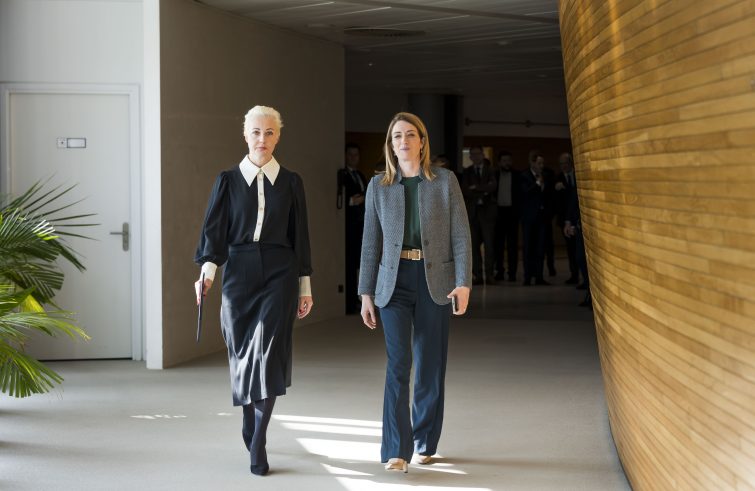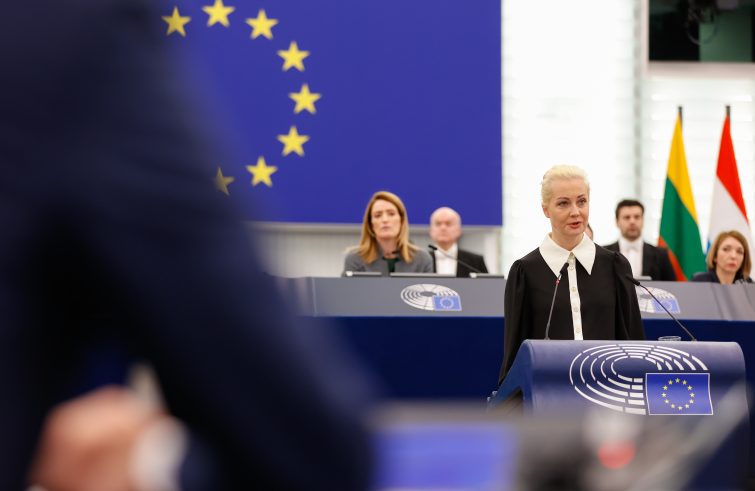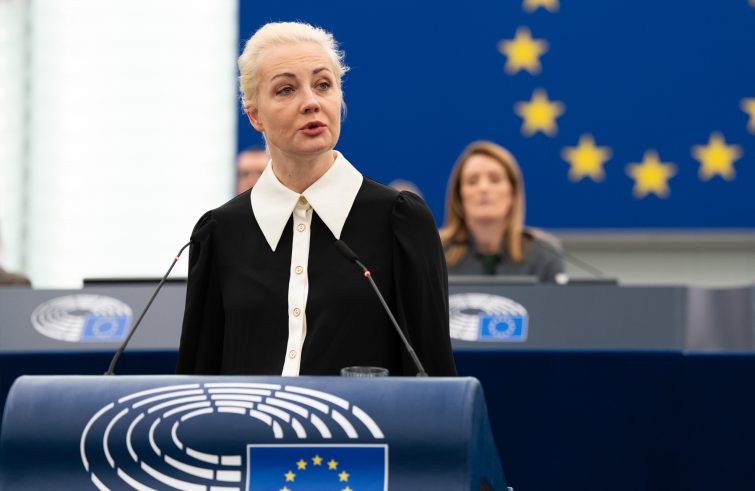
It was an opportunity to honour Alexei Navalny, who was killed – it now seems certain – in a Russian gulag in Siberia. But it also served to remind Europe and the rest of the world that Vladimir Putin, “at the head – according to the dissident’s widow – of a criminal gang” that holds Russia in its grip, is to blame for his death, along with the thousands of deaths in Ukraine. “Putin must answer for what he has done to my country. Putin must answer for what he has done to a peaceful neighbouring country. And Putin must answer for everything he has done to Alexei.” Yulia Navalnaya, the widow of the Russian dissident who died in prison on 16 February, did not mince her words when she addressed MEPs in Strasbourg on Wednesday 28 February.
“The evil will fall…”. “My husband will never see the beautiful Russia of the future. But we have to. I will do my best to make his (Alexei’s) dream come true. The evil will fall, and that beautiful future will be a reality”. Her speech was punctuated by several rounds of applause. As tears welled up in her eyes, Navalnya said: “After Putin’s first attempt on Alexei’s life, we spent several months in southern Germany. Alexei was recovering from the poisoning, he was starting to walk and write again. We went for walks, sometimes on short trips. On one of these trips we took the children to Strasbourg… Now my husband is dead. I am back in Strasbourg, but I am not here with my family. I am here now to address you and, through the European Parliament, the whole of Europe.” “I thought the 12 days since Alexei’s death would give me enough time to prepare for this speech. But we spent a week recovering Alexei’s body and organising a funeral. Then I had to choose the cemetery and the coffin”. Navalny’s funeral will take place on the 1st of March, “and I still don’t know if it will be peaceful or if the police will arrest those who have come to say their last goodbyes to Alexei.”
- (Photo European Parliament)
- (Photo European Parliament)
“Putin has killed my husband”. “Last Saturday marked two years since Putin started a full-scale war against Ukraine. A brutal, devious war. The world rushed to Ukraine’s aid. But two years have passed. Exhaustion, bloodshed and disappointment are widespread. Everything has been done to stop the war: arms, money, sanctions — nothing is working.” “The worst has happened — everyone has got used to the war.” In her speech, Yulia Navalnaya openly accused the Russian president:
“Putin killed my husband, Alexei Navalny. On his orders, Alexei was tortured for three years: He was starved to death in a tiny stone cell, cut off from the outside world. And then they killed him.”
The Russian dissent’s widow added: “”On the one hand, this public murder has shown everyone once again that Putin is capable of anything and that you cannot negotiate with him. Then again, I can see how shocked everyone is. Many people think that Putin cannot be defeated. And in this despair, they ask me: how can I help? I have thought about how Alexei would answer this question. I will try to answer it, but first I must tell you something about him. Alexei was an innovator. He always had new ideas about everything, but especially about politics. He was always full of ideas and was always experimenting.” When he was banned from speaking on television,” Navalny’s widow said, “he learned to make YouTube videos so that the whole country could see them. Even in Putin’s gulag, Alexei managed to communicate thoughts and projects that would have sent the Kremlin into a panic. He was the opposite of boring. That is the answer to the question.”
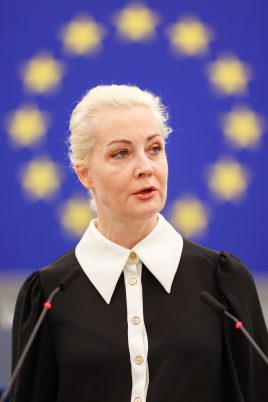 President at the head of a criminal syndicate. She went on to say: “If you really want to defeat Putin, you have to become an innovator. And you have to stop being boring. You can’t hurt Putin with another resolution or another set of sanctions that are no different from the previous ones. You can’t defeat him by thinking he’s a man of principle, who has morals and rules. He is not, and Alexei realised that long ago. You’re not dealing with a politician, you’re dealing with a bloody mobster. Putin runs an organised criminal gang.” This “includes poisoners and murderers, but they are all puppets in his hands. The most important people are those close to Putin, his friends, associates and the keepers of the mafia’s money.”
President at the head of a criminal syndicate. She went on to say: “If you really want to defeat Putin, you have to become an innovator. And you have to stop being boring. You can’t hurt Putin with another resolution or another set of sanctions that are no different from the previous ones. You can’t defeat him by thinking he’s a man of principle, who has morals and rules. He is not, and Alexei realised that long ago. You’re not dealing with a politician, you’re dealing with a bloody mobster. Putin runs an organised criminal gang.” This “includes poisoners and murderers, but they are all puppets in his hands. The most important people are those close to Putin, his friends, associates and the keepers of the mafia’s money.”
“You and all of us must fight this criminal gang. And the political innovation here is to apply the methods of fighting organised crime, not political competition”.
“Not diplomatic notes, but investigations into the financial machinations. Not statements of concern, but a search for mafia associates in your countries, for the discreet lawyers and financiers who are helping Putin and his friends to hide money”. In conclusion: “You have reliable allies in this fight – there are tens of millions of Russians who are against Putin, against the war, against the evil he brings. We must work with them.”
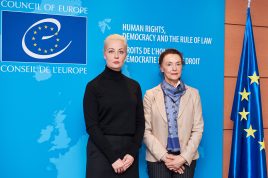 Yulia’s courage. “Navalny’s murderers have failed,” said Roberta Metsola, President of the European Parliament, welcoming Yulia Navalnaya. “The hope he represented remains as bright as ever.” “Alexei Navalny did not give up when they tried to poison him. He did not give up when he was unjustly imprisoned. He did not give up when his sentence was extended in a sham trial.” “Democracy takes bravery, and Alexei understood that. That is why he went back to Russia in 2021”, challenging Vladimir Putin’s regime. And the regime was “afraid of him.”: “The pillars of utocracy, in the end, always crumble under the weight of its own corruption and people’s inherent desire to live freely.” During her brief stay in Strasbourg before her departure for Russia, Yulia Navalnaya met with the Secretary General of the Council of Europe. Marija Pejčinović Burić stressed that Navalny’s death “cannot be separated from the grave human rights violations he endured”. Pejčinović Burić therefore “deplored the unprecedented crackdown on civil society and human rights defenders in the Russian Federation”. In this context, she commended Mr Navalny’s courage “to strive for a free and democratic Russia, as well as Yulia Navalnaya’s determination to continue her husband’s legacy.”
Yulia’s courage. “Navalny’s murderers have failed,” said Roberta Metsola, President of the European Parliament, welcoming Yulia Navalnaya. “The hope he represented remains as bright as ever.” “Alexei Navalny did not give up when they tried to poison him. He did not give up when he was unjustly imprisoned. He did not give up when his sentence was extended in a sham trial.” “Democracy takes bravery, and Alexei understood that. That is why he went back to Russia in 2021”, challenging Vladimir Putin’s regime. And the regime was “afraid of him.”: “The pillars of utocracy, in the end, always crumble under the weight of its own corruption and people’s inherent desire to live freely.” During her brief stay in Strasbourg before her departure for Russia, Yulia Navalnaya met with the Secretary General of the Council of Europe. Marija Pejčinović Burić stressed that Navalny’s death “cannot be separated from the grave human rights violations he endured”. Pejčinović Burić therefore “deplored the unprecedented crackdown on civil society and human rights defenders in the Russian Federation”. In this context, she commended Mr Navalny’s courage “to strive for a free and democratic Russia, as well as Yulia Navalnaya’s determination to continue her husband’s legacy.”

